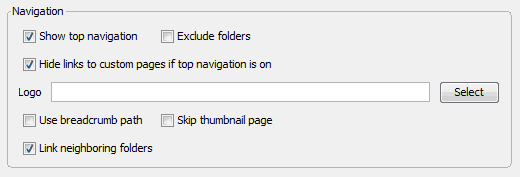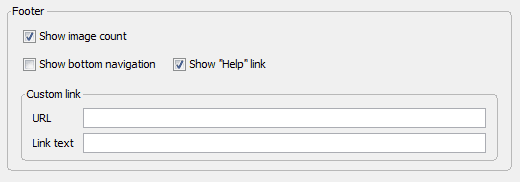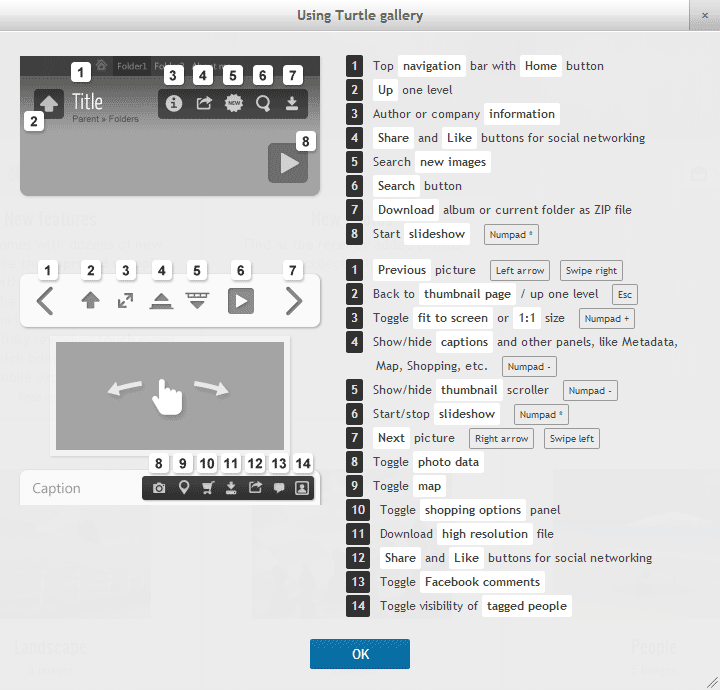Site
Navigation

- Show top navigation
-
Adds a multi-level top navigation bar above the header.
- Exclude folders
-
Only the custom pages will show up in the top navigation, e.g. Contact, About, etc.
- Logo
-
Select a logo graphics to be used as home button throughout the album.
Create a PNG or JPG file resized to fit into the 200×40px boundary.
Note, you must not remove the logo file from where it was added, otherwise Turtle will use the default "home" logo instead.
- Hide links to custom pages if top navigation is on
-
No links will appear below (or above) the thumbnails if you select this option, (provided the top navigation is on).
- Use breadcrumb path
-
Adds a clickable path to all parent folders, below the page title.
- Skip thumbnail page
-
Jumps directly to the first image (if any) in dynamic mode, provided there are no subfolders in the current directory.
- Link neighboring folders
-
Adds link to the previous and next folders (if exists) in the current level of the album.
Features

- Use search
-
Visitors can search photos throughout the album. The search database is built from the titles, comments, keywords and the names added as facetags previously with Picasa. If more keywords provided the search will list photos matching any of them.
Please note, in order the skin can crawl through the whole album to create the search database, you'll need to turn on processing the subfolders: Settings / Advanced / Process subdirectories = ON and Settings / Advanced / Process only updated subdirectories = OFF.
- Use the "Search new images" feature
-
Adds a dedicated search button for images modified in the past X days. By default it's 30 days. If you specify a time span in Mark new files, this feature will take over that number too.
This feature is using the same code as
Search
, and similarly it needs the processing on subfolders enabled.You can also have a separate (stationary) page of images added to the album lately by the "New photos" custom page
- Mark files "new" …
-
Add a "NEW" label on thumbnails modified or added recently.
- Reference
-
Choose the refence date to decide if a photo is "new" or not.
- File modified is marking the files that were modified in the past X days when the album is visited.
- Date taken is based on the "original date" when the photo was taken. This is also relative to album view time.
- Added to album option marks the images that are added within X days at the time the album was made.
Please note this option makes the "new" labels "hardwired", that is it won't remove the labels after the given period is over.
- Offer download as ZIP for ...
-
A button will be placed in the header to facilitate downloading images:
- Scaled-down images Only the scaled-down images (created by jAlbum) will be included in the ZIP file. One ZIP is created per folder.
- Originals All the original images will be included, you don't even have to turn on Link to originals or Include original. (One ZIP per folder)
- Included originals Only those originals will be included, that you've selected with right-click → Include original. Or all if Link to originals is selected on Settings → Pages with Copy originals ON.
- The whole album All the album will be included in a single ZIP file. Every download button will link to this single file.
Although Turtle tries to figure out if creating the ZIP file is necessary, it might happen you need to refresh the ZIP files manually by removing them from the output directory Ctrl Shift O.
Footer

- Show image count
- Shows number of images (and other files) in the album. Always includes the images in the subfolders too. In a deeper level it shows the number of images in the current folder and below.
- Show bottom navigation
- Displays links to top level folders and custom pages on all index pages for an easier navigation.
- Show "Help" link
- Will add a Help link in the footer. Clicking this link will bring up Turtle's help window.
Note, the help window can be always activated by the F1 key, even if there's no Help link.
- Custom link
- Displays a link to any page of your choice. URL is the new address, Link text is the anchor text.
You can use both absolute (http://site.com/) or relative URL's (../legal.html). Note, "www.mysite.com" is still a relative address, given an absolute address should start with "https://" or "https://".
